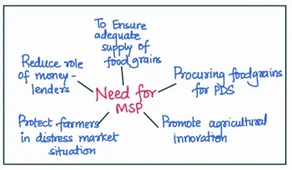Answer:
| Approach:
Introduction
Body
- Mention the key aspects of MSP.
- Mention how MSP can help the small farmers specifically to escape the debt trap.
Conclusion
- Mention that MSP has benefits, but its effect has become stagnant. Thus it needs reforms.
|
Introduction:
MSP is a form of market intervention by the Government of India to insure agricultural producers against any sharp fall in farm prices during bumper production years. The major objectives are to support the farmers from distress sales and to procure food grains for public distribution.
Body:
Minimum Support Price (MSP)
- On the basis of the recommendations of the Commission for Agricultural Costs and Prices (CACP), Government of India declares minimum support prices for certain crops before each sowing season.
- Under the APMC Acts, the sale of agricultural commodities can occur at Agricultural Produce Market Committee (APMC) Mandis only. However, a farmer may not get remunerative prices at the Mandi either due to bumper production /supply which brings down the market prices or due to price-fixing by the mandi-agents.
- Government agencies purchase the entire quantity offered by the farmers at the announced minimum price.
- Thus, a farmer always has the option to sell the produce to the government if he can’t get remunerative prices from the open market.

MSP help farmers from Low-income trap by:
- Prevent distress sale: MSP assures farmers of a minimum price for their crops when market prices fall below the MSP. This prevents distress sale by farmers i.e., selling the produce at throw away prices because of the need for money to buy inputs for next sowing season.
- Increased output: MSP also encourages farmers to produce more, as they have the assurance of getting a good price for their crops, which leads to an increase in agricultural output.
- Reduced role for moneylenders: Assurance of income helps prevent the hold of moneylenders from rising further as the farmers no longer feel the need to borrow money at such huge costs.
- Helps to make informed decisions: Government announces MSP before the sowing season for 23 crops including cereals, pulses, oilseeds & certain cash crops. This advance information helps the farmer to make an informed decision about which crop to sow for maximum economic benefit within the limitations of his farm size, climate and irrigation facilities.
- MSP as a benchmark for private buyers: MSP sends a price-signal to market that if merchants don’t offer higher than MSP prices the farmer may not sell them his produce. While it doesn’t guarantee that market prices will always be higher than MSP, but atleast it ensures that the market prices will not be drastically lower than MSP.
Some concerns:
- Previous Economic Surveys have observed that MSP procurement is not uniform across all states and a significant portion of pulses & oilseeds were sold below the MSP.
- MSP is now seen simply as a political tool used by parties to gather support.
- MSP has led to monoculture in agriculture as almost all of the farmers are involved in cultivating rice and wheat which yield a good amount of MSP.
- Declining investment in quality: Assured price gives little incentive for farmers to engage in improving quality of their produce.
- Unequal access: Not all farmers have equal access to the benefits given by the government through MSP. Several regions in the country do not have effective implementation of the scheme.
Conclusion:
The objectives with which MSP was introduced has been only partially met. Hence, reforming the MSP procurement system is the need of the hour.
